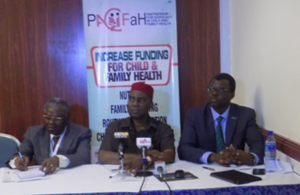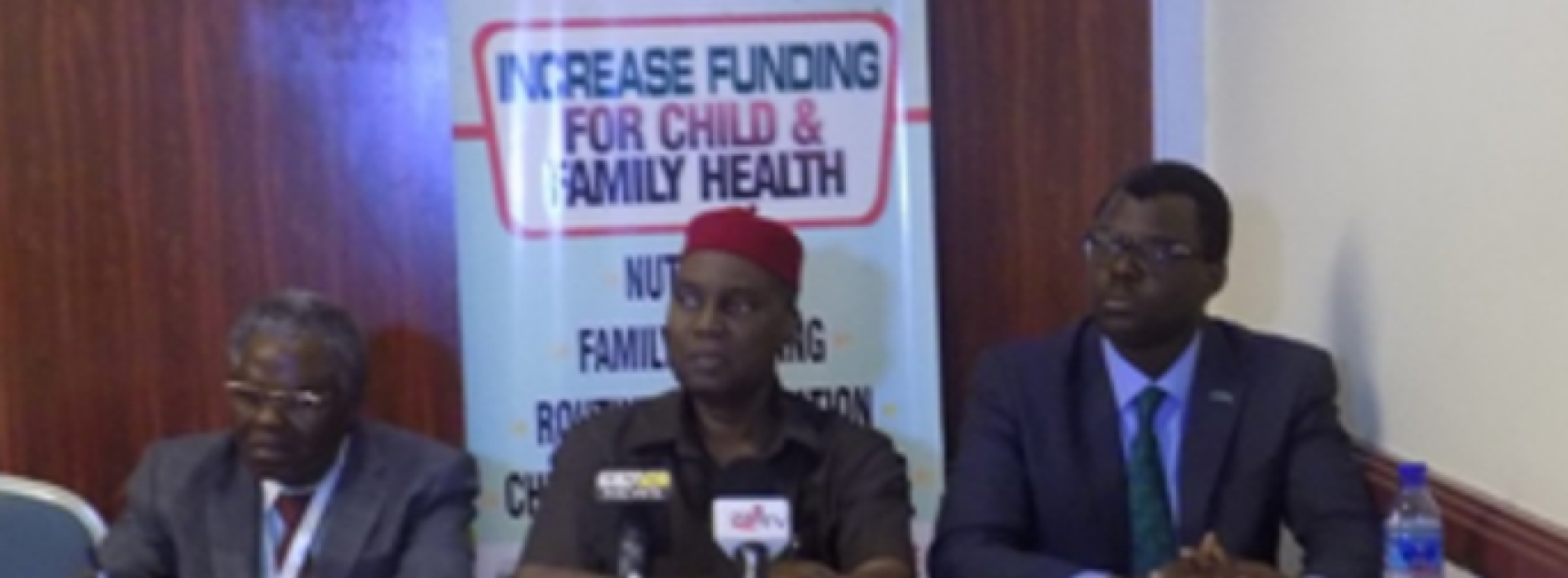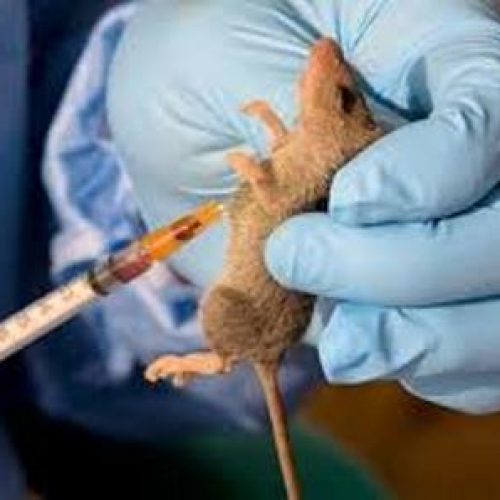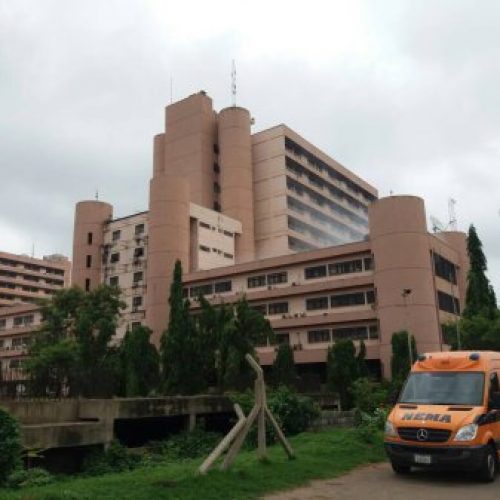2016 Health budget controversy: Group demands increase funding for PHC

L-R: National President, Nigeria Medical Association (NMA), Dr. KayodeObembe; Chairman HERFON Board of Trustees, Dr. Ben Anyene; PSN-PACFaH Program Director for Strategy, Pharm. Remi Adeseun, at the one-day PACFAH meeting on the 2016 budget in Abuja.
Stakeholders have called for the inclusion of 1% consolidated federal revenue to fund primary health care (PHC) in the new version of the 2016 health budget to be submitted to the National Assembly, saying the budget ought to respond to the needs of the people and national health priorities.
It will be recalled that the Health Minister, Prof. Isaac Adewole, on invitation by the National Assembly to defend the Ministry’s 2016 budget had discovered that the health budget before the Assembly was not the original budget it prepared.
According to him, the figures were in contrast with the priorities of the health sector and some of the votes earmarked by the ministry for some activities had been re-distributed while some important fields in the sector had been excluded.
He said: “In the revised budget as re-submitted, N15.7 billion for capital allocation has been moved to other areas.
“Some allocations made are not in line with our priorities. There is nothing allocated to Public Health and Family Health. Over the last two years, nothing has been done on HIV…
Based on this, the budget was retrieved and a fresh budget will be presented by the health minister in a matter of days.
However, a coalition of health-related non-governmental organizations known as Partnership Advocacy in Child and Family Health, PACFaH, last week advocated for the 1% of consolidated federal revenue, to be included in the new budget.
They also stressed the need for increased funding, timely release, and efficient utilization of resources in the 2016 health budget.
According to them, child and family health, nutrition, family planning, routine immunisation and childhood killer diseases, should be given priority
According to Dr. Ben Anyene, Chairman, Board of Trustees HERFON, Federal government need to take immediate steps to ensure full implementation of the provisions of the National Health Act 2014.
“ it must insist on full use of the new zero-based budgeting framework and template by all MDAs and especially the FMoH in subsequent budgets.
“The FGN should establish a platform for health financing interface between Federal, State, and Local Governments to increase synergy and reduce duplication and wastages; more funding options should be explored to ensure sustainable health financing for better health outcomes”, the group said.
It advised government to be open in the budget process for more transparency responsiveness and accountability and should develop a framework for participation of CSOs and professional associations in all budgeting process; from conception to design and implementation.
In reaction to this, The Chairman Federal House of Assembly Committee on Appropriation, Hon. Abdulmumin Jibrin, gave assurance that it was not too late to include the 1% Consolidated Revenue Fund (CRF), in the current appropriation, stating that the committee would critically scrutinise the budget to work out the modality to accommodate the allocation to provide for effective health care services at all levels.
The Chairman made this known during an advocacy visit to Speaker of the House, Hon. Yakubu Dogara by Civil Society Legislative Advocacy Centre (CISLAC) and a developmental partner, primarily to advocate for fund mobilization and adequate budgetary allocation to child and family health in the country.
“While the whole essence of advocacy is to educate and inform the legislature of important issues affecting the country, the issues affecting budgetary allocation to child and family canvassed by the group have informed the Committee to without further delay, constructively work out modality and prioritise the 1% Consolidated Revenue Fund (CRF) to the Health Sector as stipulated in the National Health Act, 2014,” Hon. Jibrin added.
The group was received by Deputy Majority Leader, Chairmen of House Committee on Appropriation, Health, Agriculture, Women Affairs, Finance, Sustainable Development Goals (SDGs), Rules and Business, CSOs and Developmental Partners, Petroleum Down Stream as well as the Director General of National Institute for Legislative Studies (NILS).
Speaking during the visit, the group said it has a mandate to support Government of Nigeria to identify and assist in scaling up of high impact solutions that could help people lift themselves out of poverty and build better lives. It charged the House on exhaustive oversight to ensure effective implementation of the National Health Act.
The group said: “We aim to reduce the number of preventable deaths by improving access to healthcare, particularly for women during pregnancy, by strengthening childhood immunization programs; and work with Non-Governmental Organisations and Civil Society Organisations to advocate to policy makers and raise public awareness in child and family health.
“We also collaborate with smallholder farmers to increase the yield of priority crops, such as yam, cassava, sorghum, cowpeas, and rice, and improve the agricultural productivity of livestock.”
The Speaker of the House represented by the Deputy Majority Leader, Hon. Buba Jubril, commended the group on its research and evidence-based advocacy in the health and agricultural sector, advising that the group to also consider advocating to the executives to ensure effective implementation of the Health Act at all levels.
About author
You might also like
Lassa fever hits Ebonyi State
… 2 doctors, 1 patient dead The Nigeria Centre for Disease Control (NCDC) has confirmed the outbreak of Lassa fever in Ebonyi State. The centre also confirmed the death of two
Breaking: Health Ministry on fire
• Spokesperson8 says no damage recorded, fire successfully put off ABUJA – The building housing the Federal Ministry of Health at the Federal Secretariat in Abuja is currently on fire.
Lassa fever death toll rises
The Nigeria Centre for Disease Control said the number of deaths associated with Lassa fever in January 2020 had risen to 24, with 163 cases reported confirmed, The PUNCH reports.






0 Comments
No Comments Yet!
You can be first to comment this post!